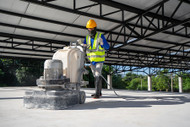Wastewater infrastructure tends to have sizable cracks and leakages. This leads to infiltration, where groundwater also mixes up with domestic wastewater. Cracks in the wastewater concrete system may be due to numerous reasons. Harsh chemicals, seasonal temperatures, or freezing cold expose the wastewater structures and make them weaker. Over the passage of time, these sanitation infrastructures have become a great challenge for maintenance and health as well.
Problems with wastewater infrastructure
Many wastewater infrastructures are old, and over time, the sewage system becomes decayed and rotten. Due to the timely damages, certain challenges arise that significantly negatively influence the water treatment process. Among all challenges, a few of the most significant challenges are as per the following.
a: Extensive Damage
The wastewater facility and system are made of concrete and metal. Both of these compounds are vulnerable to corrosion. With ageing, concrete would erode from direct exposure to cold and hot temperatures. The wastewater facility and infrastructure need to be based on a solid compound that can have a natural resistance to disasters and deposits as well.
b: Expenses
One of the major repercussions that wastewater facilities are facing is a financial challenge. Even the smallest crack or damage demands expensive attention. The construction and process of maintaining the wastewater facility are not easy.
Treating Wastewater with Polyurea
Wastewater and sewage leakage can be troublesome and expensive. Maintaining the wastewater treatment infrastructure requires an advanced polyurea protective coating as a measure to strengthen and prevent sewage damage. Polyurea coating is the best restoration option for all major and minor structure damages like leaks or cracks.
The major reason to apply polyurea for wastewater treatment is its characteristics of longevity and durability. With tensile strength and traditional materials, the leakage or crack becomes waterproof and contains resistance to the chemical. Instead of restructuring the system with concrete and heavy material, the polyurea coating becomes the most cost-effective protection against the wastewater infrastructure.
As the most durable, corrosion-resistant solution, polyurea coatings have the unique capability to solidify and seal cracks, increasing long-term wastewater management. One of the most prominent capabilities of polyurea in administering solutions for cracks and leakage is low maintenance. Advanced polyurea coatings have the flexibility to withstand freezing temperatures and resist high temperatures.
For the treatment of wastewater, plants and polyurea significantly increase the lifespan of cement or concrete. Especially keeping the waterproof ability in mind. Polyurea has the capacity to prevent water exfiltration and groundwater infiltration due to its unmatched impermeability. Its coating acts as a rehabilitative measure for any sort of damage that occurs.
As long as there are preventive measures administered in the wastewater facilities, the polyurea can be protective and tends to keep the infrastructure stable.
Benefits of Using Polyurea for Treating Wastewater Infrastructure
- Durability & Longevity: Polyurea coatings provide long-lasting protection with high tensile strength, offering resilience against cracks and leaks in wastewater systems.
- Corrosion Resistance: Polyurea is highly resistant to corrosion, protecting infrastructure from damage caused by harsh chemicals and extreme temperatures.
- Cost-Effective: Compared to traditional repairs involving concrete, polyurea coatings are a cost-efficient solution, reducing the need for frequent maintenance and expensive restorations.
- Waterproofing: Polyurea offers excellent waterproofing capabilities, preventing groundwater infiltration and water exfiltration, which are common issues in wastewater facilities.
- Chemical Resistance: Polyurea forms a protective barrier resistant to the harsh chemicals typically found in wastewater, maintaining the integrity of concrete and metal surfaces.
- Flexible in Extreme Temperatures: Polyurea maintains its performance in freezing and high temperatures, making it suitable for a variety of climates and environments.
- Fast Application & Cure Time: Polyurea coatings can be applied quickly and cure rapidly, minimizing downtime and allowing for immediate restoration of infrastructure.
- Low Maintenance: With its durable and flexible nature, polyurea requires minimal maintenance, saving time and resources over the long term.
- Enhanced Infrastructure Stability: Polyurea helps to stabilize wastewater infrastructure, extending the lifespan of concrete and preventing further degradation.
- Environmentally Friendly: Armorpoxy’s polyurea products undergo rigorous testing, ensuring they are eco-friendly and meet industrial standards.
Polyurea is a reliable solution for wastewater management, enhancing infrastructure performance while reducing overall costs and downtime.
Why use Armorpoxy products?
Armorpoxy has an extensive range of products that can meet the specific needs and demands of nearly all industries. Their Polyurea product meets continual testing and ultimately achieved an environmentally friendly coating tag. For wastewater management facilities, polyurea is highly resistant and strong. They are available in an affordable range and packed with industrial-standard quality.

